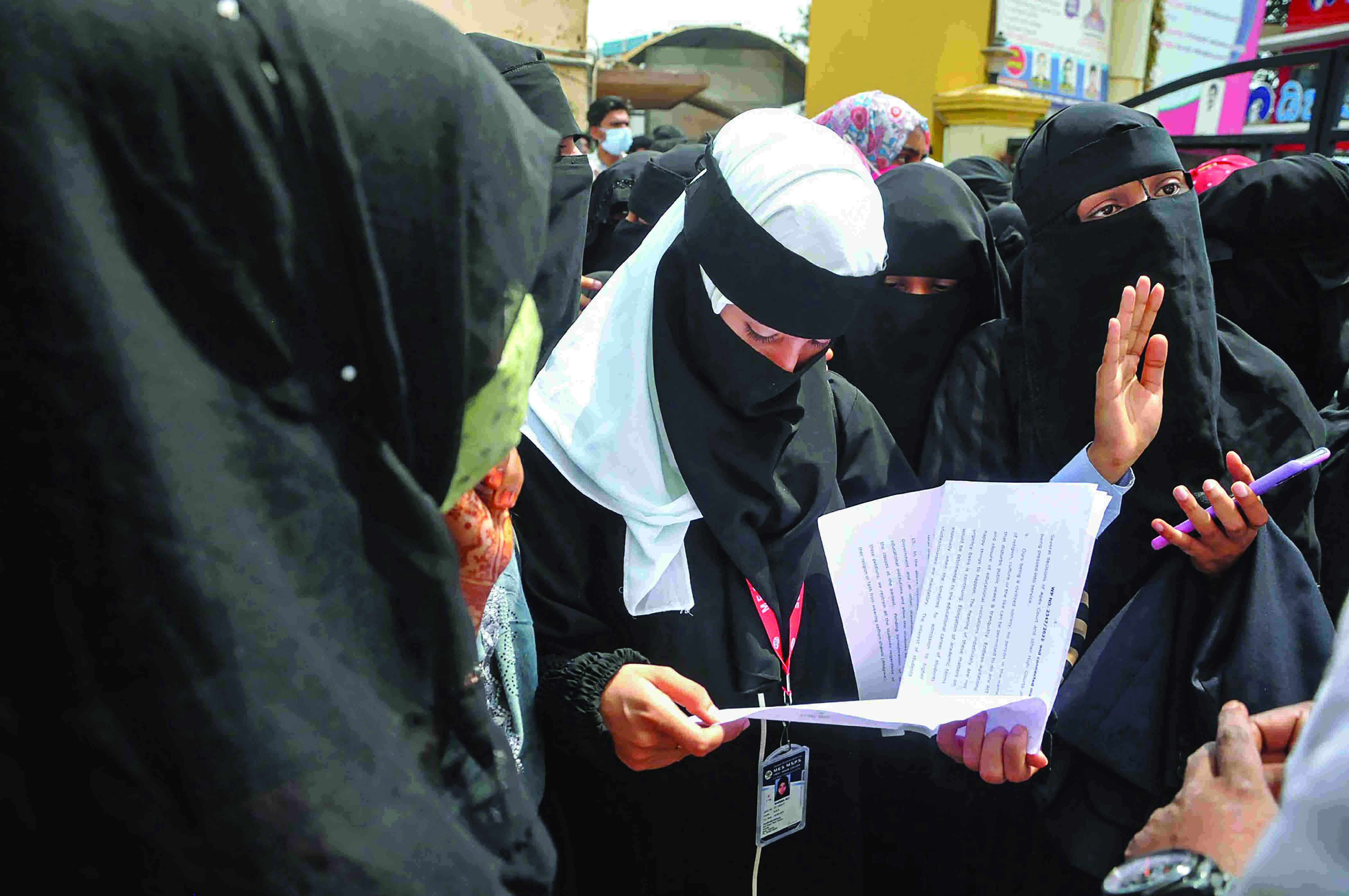'So many religious symbols in India but hostile discrimination against us'

Bengaluru: Contending that Indians flaunt diverse religious symbols, from the pendant to the Hijab to the 'bindi' and turban, the Muslim girls fighting the hijab ban in Karnataka on Wednesday asked why the government was 'picking' on the headscarf alone and making "this hostile discrimination."
Prescribing uniforms in the pre-university colleges is illegal, they said, adding, the College Development Committee (CDC) headed by the MLA concerned has no powers to decide on the issue.
Citing a survey, petitioner girls' counsel Ravi Varma Kumar said people of the country sport various religious symbols such as pendant, crucifixion, hijab, burqa, bangles, bindi on the forehead and the turban.
"I am only showing the vast diversity of religious symbols in all sections of the society. Why is the government picking on hijab alone and making this hostile discrimination? Aren't bangles religious symbols?" Kumar told the full bench of the High Court comprising Justice Ritu Raj Awasthi, Justice J M Khazi and Justice Krishna S Dixit.
Questioning why no other religious symbol was considered in the government order and only the hijab, the senior counsel wondered whether that was done because of his petitioners' faith.
"This discrimination against Muslim girls is purely on the basis of religion and hence a hostile discrimination, which violates Article 15 of the Indian constitution. We are not heard but straightaway punished. This is draconian," he argued.
Kumar told the court that the purpose of education is to promote plurality and not homogeneity.
Meanwhile, chaos prevailed on Wednesday in several pre-university colleges in Karnataka, which were opened on Wednesday after remaining shut for a week owing to the hijab row, as the burqa-clad Muslim students were not let in.
Amid tight security with policemen deployed in and around pre-university colleges at many sensitive places, the day saw a section of Muslim students remaining adamant not to remove the burqa, let alone hijab, the Islamic scarves.
In Udupi district, pre-university and degree colleges reopened on Wednesday even as police are keeping a vigil around the colleges where prohibitory orders under Section 144 of CrPC have been clamped. The six Muslim girl students, who have moved the Karnataka High Court against a ban on hijab remained absent, principal of the government PU college for women at Udupi, Rudre Gowda said.
Classes are being held smoothly at the college where other Muslim students removed hijabs before entering classrooms.
The 23 girl students who also insisted on wearing hijab at the government PU college at Kundapur in the district also kept away from classes on Wednesday. They were made to sit in a separate room last week when they refused to remove the headscarves before entering classes.
"Classrooms should be a place for recognition and reflection of the diversity in society," Kumar contended.
Regarding the ban on hijabs, he said that according to rule 11 of the 1995 rules —government provisions related to the Education Department — the educational institutions should give notice to the students and parents about changing uniform at least a year in advance.
Stating that a dress code is not mandatory for the pre-university colleges, Kumar said: "Prescribing uniform in the government pre-university college is illegal. Even the guidelines issued by the PU Education department in 2021-22 did not speak about uniform."
"It is an emphatic statement by the department that principals cannot prescribe a uniform. Neither the pre-university board and the rules nor the Karnataka Education Act prescribe any uniform or prohibition of hijab. Such being the case, under what authority are we kept out of the class," he asked on behalf of the girls.
The government order said the students should wear a uniform prescribed by the CDC headed by MLAs concerned, which meant that the it has delegated its administrative powers to the legislators.
The CDCs, according to Kumar, were constituted by way of a circular in 2014 and not any government order.
He further told the bench that the CDCs were constituted for utilising grants as well as maintain education standards. This CDC was not for students welfare but only for academic standards, he contended.
Questioning the formation of CDCs, Kumar argued the MLAs in the CDCs have been given administrative powers.
The court adjourned a further hearing of the case to Thursday.



